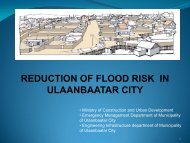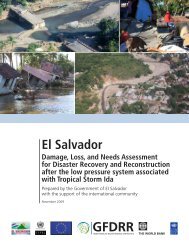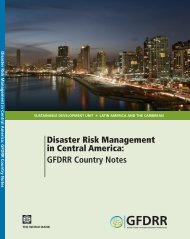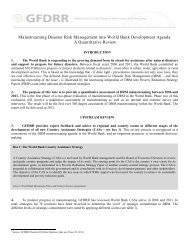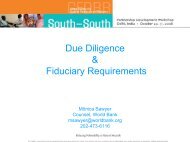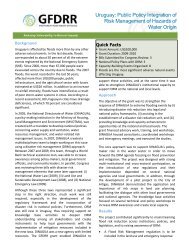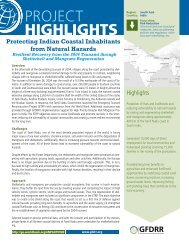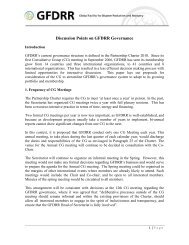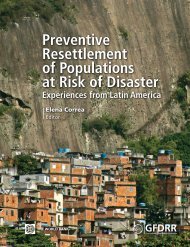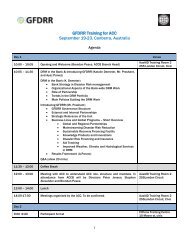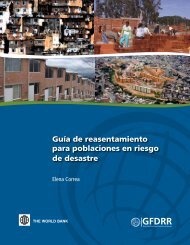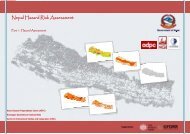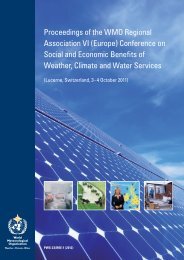- Page 1 and 2:
Rapid Assessment for Resilient Reco
- Page 3 and 4:
©2012 The World Bank The World Ban
- Page 5 and 6:
ACKNOWLEDGEMENTS This Rapid Assessm
- Page 7 and 8:
Health Sector comprised Chalermrat
- Page 10 and 11:
LIST OF TABLES Table 1: Summary of
- Page 12 and 13:
Table 61: Heritage sector - Damage,
- Page 14 and 15:
ACRONYMS ACHR ADPC AIS AIT AM AOT A
- Page 16 and 17:
IFC International Finance Corporati
- Page 18:
TATA Thailand Association of Travel
- Page 21 and 22:
The floods will negatively affect t
- Page 23 and 24:
Recovery and reconstruction needs a
- Page 25 and 26:
esources and levels of assistance a
- Page 27 and 28:
8 THAI FLOOD 2011 RAPID ASSESSMENT
- Page 29 and 30:
1 THE DISASTER 1.1 Introduction Tha
- Page 31 and 32:
esponsible for the establishment of
- Page 33 and 34:
14 THAI FLOOD 2011 RAPID ASSESSMENT
- Page 35 and 36:
2 DAMAGE, LOSSES AND NEEDS 2.1 Intr
- Page 37 and 38:
and in Sratawaew sub-district; in U
- Page 39:
2.4 Productive Sectors Agriculture
- Page 42 and 43:
Damage and Losses Damage Flood wate
- Page 44 and 45:
Losses Crops The flood severely aff
- Page 46 and 47:
Table 9 summarizes the total damage
- Page 48 and 49:
Challenges to Recovery and Reconstr
- Page 50 and 51:
Strategy for Short-, Medium- and Lo
- Page 52 and 53:
B.) Limit cropping intensity • In
- Page 54 and 55:
The Disaster Prevention and Mitigat
- Page 56 and 57:
Industry Sector 30 Summary The obje
- Page 58 and 59:
Damage The total damage to building
- Page 60 and 61:
lanket tax holidays not be provided
- Page 62 and 63:
4. Support for facilitation of skil
- Page 64 and 65:
strategies. These efforts target th
- Page 66 and 67:
encouraged at-home-travel through a
- Page 68 and 69:
Damage Reported damage to the secto
- Page 70 and 71:
usiness is welcomed, it does not co
- Page 72 and 73:
The recovery of the tourism sector
- Page 74 and 75:
Recommended Recovery Actions ~6 mth
- Page 76:
Financial and Insurance Sector Summ
- Page 79 and 80:
Damage and Losses Commercial Bankin
- Page 81 and 82:
are the main borrowers of these two
- Page 83 and 84:
The bond market 58 became more acti
- Page 85 and 86:
Microfinance, including micro-agric
- Page 87 and 88:
Government Measure Loan guarantee f
- Page 89 and 90:
Aside from the impact of the propos
- Page 91 and 92:
Suggestions for short-term measures
- Page 93 and 94:
See DRM chapter for recommendations
- Page 95 and 96:
2.5 Infrastructure Sectors Summary
- Page 97 and 98:
Furthermore, the flood risk analysi
- Page 99 and 100:
navigation, etc.) throughout the ba
- Page 101 and 102:
Flood events have worsened in recen
- Page 103 and 104:
How to Strengthen the Ring’s Dike
- Page 105 and 106:
International Best Practice in Floo
- Page 107 and 108:
Sector Context According the WHO/UN
- Page 109 and 110:
Province Total No. of Wells No. of
- Page 111 and 112:
In the Bangkok metropolitan area, t
- Page 113 and 114:
In other urban centers around the c
- Page 115 and 116:
Sector Context For most of the affe
- Page 117 and 118:
decision making sections of governm
- Page 119 and 120:
It is important to recognize the de
- Page 121 and 122:
Transport Sector Summary Thailand
- Page 123 and 124:
Sector Context Transport contribute
- Page 125 and 126:
While the damage is relatively stra
- Page 127 and 128:
Losses Based on available informati
- Page 129 and 130:
Recovery and Reconstruction Require
- Page 131 and 132:
characteristics in one area can hav
- Page 133 and 134:
• Complete the resilience-related
- Page 135 and 136:
Some recommendations here are simil
- Page 137 and 138:
Sector Context The electricity sect
- Page 139 and 140:
Total net income of the MEA in 2010
- Page 141 and 142:
Losses Losses to generation, transm
- Page 143 and 144:
Recovery and Reconstruction Require
- Page 145 and 146:
Category Type ~6 months 6-24 months
- Page 147 and 148:
Sector Context The telecommunicatio
- Page 149 and 150:
damaged cell sites were in the prov
- Page 151 and 152:
Recommendations for Resilient Recov
- Page 153 and 154:
Category Type ~6 months 6-24 months
- Page 155 and 156:
2.6 Social Sectors Health Sector Su
- Page 157 and 158:
limited buoyancy of government reve
- Page 159 and 160:
Private sector health facilities, w
- Page 161 and 162:
to upper floors. However, some medi
- Page 163 and 164:
Table 50 outlines an estimated amou
- Page 165 and 166:
capacity building. The first “R
- Page 167 and 168:
permanent flood barriers for small,
- Page 169 and 170:
o Patient medical records, includin
- Page 171 and 172:
Housing Sector Summary The 2011 flo
- Page 173 and 174:
Table 53: Damage and losses in hous
- Page 175 and 176:
Damage to Household Goods This is t
- Page 177 and 178:
maintained to keep transparency, ag
- Page 179 and 180:
o Suggestions for such a program ar
- Page 183 and 184:
MOE Commissions Disaster Impacts Ow
- Page 185 and 186:
Under the MOE, an initial assessmen
- Page 187 and 188: Public Private Total BASIC EDUCATIO
- Page 189 and 190: of all types, especially targeting
- Page 191 and 192: • Education and training on disas
- Page 193 and 194: Sub-sector / Component Disaster Imp
- Page 195 and 196: New Year for example), which are ce
- Page 197 and 198: By using GIS mapping to determine t
- Page 199 and 200: Province Name Heritage Sites and St
- Page 201 and 202: and losses, other sites with little
- Page 203 and 204: Restoration and repairs of damaged
- Page 205 and 206: activities. For those with partial
- Page 207: Sub-Sector Needs Recommendations ~6
- Page 210 and 211: in Thailand has been very effective
- Page 212 and 213: Figure 19: Waste water treatment fa
- Page 214 and 215: Province Ang Thong Ayuthaya Damage
- Page 216 and 217: estates do not have extremely high
- Page 218 and 219: 3 ECONOMIC IMPACTS
- Page 220 and 221: Calculations of the impact of the f
- Page 222: Sub-sector Infrastructure Water Res
- Page 225 and 226: 3.2 Livelihoods and Employment Intr
- Page 227 and 228: The second assumption applies the s
- Page 229 and 230: Recommendations for Resilient Recov
- Page 231 and 232: Pre-disaster planning also presents
- Page 233 and 234: Promote Labor Intensive Recovery St
- Page 235 and 236: 4 SOCIAL IMPACTS ANALYSIS AND SOCIA
- Page 237: The research team also analyzed the
- Page 241 and 242: For the urban poor, there is limite
- Page 243 and 244: Social Cohesion Better access to se
- Page 245 and 246: about the programs to have been poo
- Page 247 and 248: system of village health volunteers
- Page 249 and 250: that high media coverage has streng
- Page 251 and 252: A one-off supplemental cash transfe
- Page 253 and 254: een lost, and would thus be unable
- Page 255 and 256: often poor, disaster-prone areas. 1
- Page 257 and 258: Social Accountability, Transparency
- Page 259 and 260: 240 THAI FLOOD 2011 RAPID ASSESSMEN
- Page 261 and 262: 5 DISASTER RISK MANAGEMENT IN THAIL
- Page 263 and 264: (2) Designating National Disaster P
- Page 265 and 266: It is never too late to distribute
- Page 267 and 268: Building on the recent disaster ris
- Page 269 and 270: sea level rise and increasing rainy
- Page 271 and 272: Long-term Mainstream DRM into devel
- Page 273 and 274: Summary of DRM Needs and Recommenda
- Page 275 and 276: C. Institutional Reform Long-term n
- Page 277 and 278: CONTENTS Annex 1: Acknowledgements
- Page 279 and 280: Phumpatrakom, Puttachard Suphalucks
- Page 281 and 282: ANNEX 2: AGRICULTURE SECTOR - GOVER
- Page 283 and 284: ANNEX 3: AGRICULTURE SECTOR - ASSUM
- Page 285 and 286: Losses 1. Loss of production due to
- Page 287 and 288: MAIN QUESTIONNAIRE Encircle/Write a
- Page 289 and 290:
NOTE TO THE ENUMERATOR/INTERVIEWER:
- Page 291 and 292:
Q17. If yes, what was the value of
- Page 293 and 294:
แหล่งเงิน (g) Wha
- Page 295 and 296:
Q28. If yes, then: ถ้าใช
- Page 297 and 298:
30h. Have you had an indication fro
- Page 299 and 300:
Q35. How have the floods impacted y
- Page 301 and 302:
Q43. If yes, in what ways have they
- Page 303 and 304:
ANNEX 5: TIMELINE OF MAJOR DIKE BRE
- Page 305 and 306:
ANNEX 7: ROYAL INITIATIVES ON FLOOD
- Page 307 and 308:
For the western canal system of the
- Page 309 and 310:
ANNEX 8: OVERVIEW OF WATER RESOURCE
- Page 311 and 312:
There is a concern as to the validi
- Page 313 and 314:
mechanism to connect the new RBC me
- Page 315 and 316:
The supply assessment and regulatio
- Page 317 and 318:
Water User Organizations In general
- Page 319 and 320:
Regulatory Control of Water Resourc
- Page 321 and 322:
quality sustainability, assuming th
- Page 323 and 324:
ways - promoting awareness of water
- Page 325 and 326:
ANNEX 9: WATER SUPPLY AND SANITATIO
- Page 327 and 328:
3. Needs: a. Reconstruction Needs R
- Page 329 and 330:
10. Do you have Annual Report and A
- Page 331 and 332:
Q4. Estimation of flooding damage t
- Page 333 and 334:
Products (d) S-T Loans to large bus
- Page 335 and 336:
ANNEX 11: HEALTH SECTOR - ASSUMPTIO
- Page 337 and 338:
SARABURI 21691.68 13.48 1 Month 397
- Page 339 and 340:
ANNEX 12: HEALTH SECTOR - QUESTIONN
- Page 341 and 342:
ANNEX 13: HEALTH SECTOR - QUESTIONN
- Page 343 and 344:
คําถามที่ คํ
- Page 345 and 346:
ส่วนที่ ๔ ข้อ
- Page 347 and 348:
ANNEX 14: HOUSING SECTOR - ASSUMPTI
- Page 349 and 350:
ANNEX 15: HOUSING SECTOR - RECONSTR
- Page 351 and 352:
Needs - Recovery measures (textbook
- Page 353 and 354:
Losses due to the lack of participa
- Page 355 and 356:
Heritage Structures and Sites Sub-S
- Page 357 and 358:
No. Asset name Pre-Disaster Post-Di
- Page 359 and 360:
No. Asset name Pre-Disaster Post-Di
- Page 361 and 362:
Name of asset Locaon (City, Provinc
- Page 363 and 364:
Losses due to loss in ticket sales,
- Page 365 and 366:
ANNEX 21: CULTURAL HERITAGE SECTOR
- Page 367 and 368:
19 Nan River Floang House, A. Muang
- Page 369 and 370:
North-east Region No. ลําด
- Page 371 and 372:
13 Pak Chien Road, Amphur Chien Yai
- Page 373 and 374:
ANNEX 23: ENVIRONMENT SECTOR - METH
- Page 375 and 376:
ANNEX 24: ORGANIZATIONAL CHART OF F
- Page 377:
THE WORLD BANK 30th Floor, Siam Tow



